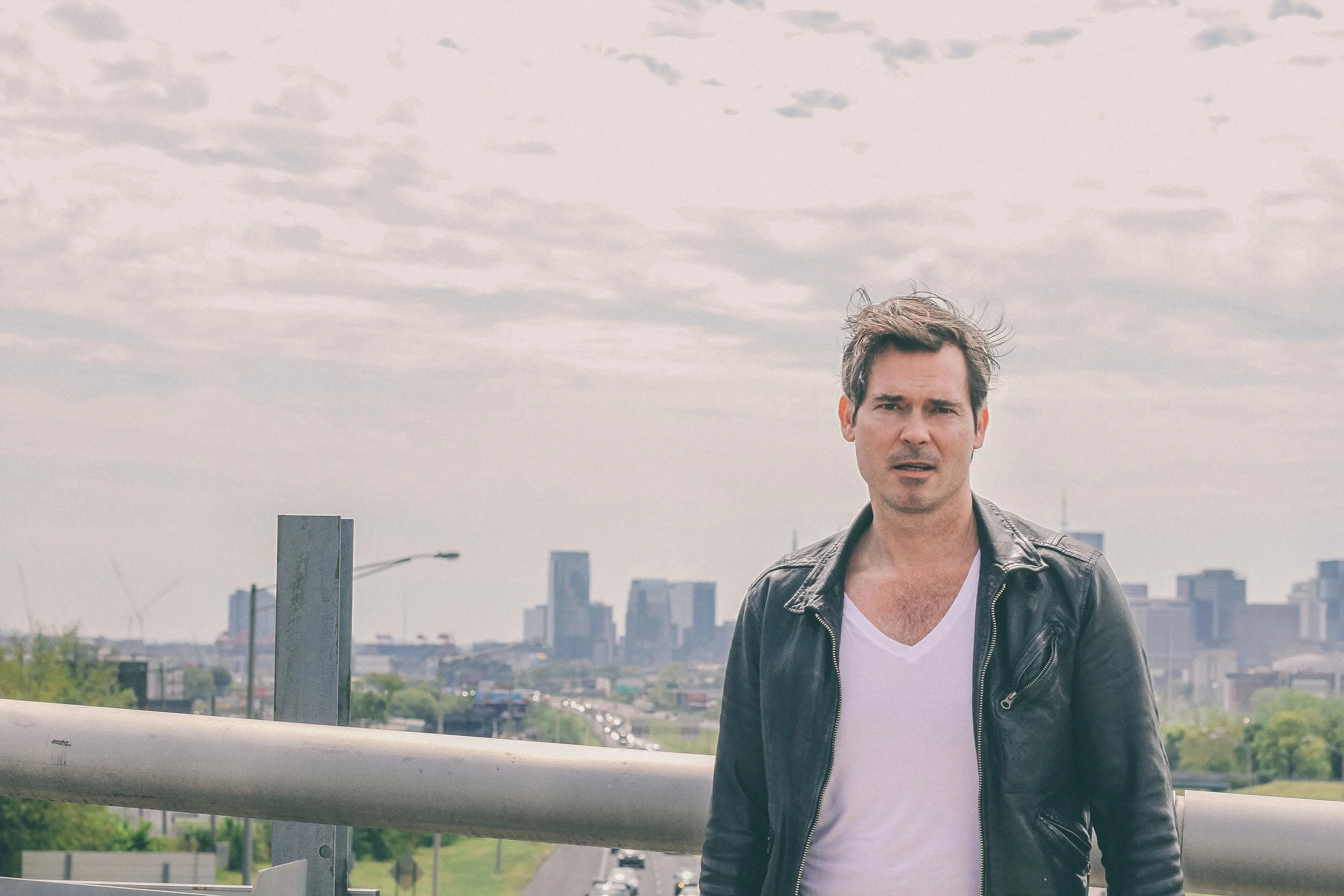Click Image to Download!
Ketch Secor was six years old when he first visited Nashville. Sitting in the church pews of the Grand Ole Opry, he watched Minnie Pearl command the stage, transfixed by country music's ability to bridge the gap between past and present. When he returned to town in 1996 — two years before forming Old Crow Medicine Show, the Grammy-winning string band that would turn him into a kingpin of American roots music — it was as a busker, playing old-time songs on street corners before shuffling back home to North Carolina.
"There was a real spontaneity and quixotic passion to my early days in Nashville," he remembers. "It took me a few years to move here permanently, but it was always my intention. I set my sights on it. Nashville was the town for me."
Now a Nashville resident for 25 years, Ketch reflects on a quarter-century spent in Music City and beyond with Story The Crow Told Me. Sharply written and wildly creative, the album marks his first full-length solo release. Its 12 songs tell the story of a Kerouac-worthy journey through the misfit wilderness of life, love, longing, and leaving home, filled to the brim with spoken-word vocal performances, punky tempos, bluegrass harmonies, honking harmonica, and fiddle. There are cameos from simpatico artists like Molly Tuttle and Marty Stuart, and even poignant samples from Bob Dylan and Johnny Cash.
Gluing that expansive mix together is Ketch himself: a roots-music ringleader, countrified carnival barker, and torchbearer of twang, skilled in reinterpreting the sounds of the past for today's audience. Here, he's much more than the fiddle-playing frontman of a beloved band; he's practically the entire band himself, playing nearly a dozen instruments ("including things like organ, bass, spoons, and electric guitar, which people don't necessarily know I play," he says) and co-writing every track. The result is a record that's equal parts coming-of-age story, road-warrior autobiography, and love letter to the city that watched him grow into a man.
"I originally wanted to write a poetry cycle," says Ketch, who first envisioned Story The Crow Told Me as a spoken-word record. Even after he teamed up with hit producer and co-writer Jody Stevens to finish the album collaboratively, the lyrical emphasis remained. On "Dickerson Road" — a tribute to East Nashville's boulevard of broken dreams, shot through with rapid-fire lyrics, guitar from the Cadillac Three's Jaren Johnston, and a booming, backwoods beat that owes as much to hip-hop as honky-tonk — Ketch lets those spoken-word roots shine.
"The Grand Ole Opry has stars and the Hall of Fame has plaques, and in the year 2000 there was one premier destination for Nashville's castoffs, rejects, ne’er-do-wells, petty thieves, lowlifes, losers and users; so like a barfly to a bottle I went to where I felt I belonged, straight up Dickerson Road," he says fondly.
As a Nashville newcomer, he spent countless hours busking along Dickerson, and the song isn't a condemnation of the road's seedy past so much as a celebration of the finger-bleeding dedication that elevated his band from the mean streets to the main stage.
Make no mistake — this isn't an Old Crow Medicine Show record, but it's impossible to separate Ketch Secor from the band whose accolades include induction into the Grand Ole Opry, two Grammys®, triple-platinum certification for "Wagon Wheel," and multiple Number 1 releases on the Billboard Bluegrass Albums chart. Two of the group's most beloved alums, Critter Fuqua and Willie Watson, even make appearances on the album, contributing vocal harmonies to songs like "Ghost Town" — which features a monologue from Marty Stuart, one of Old Crow's earliest champions — and adding some full-circle gravitas to "Catch Me If You Can." In the latter song, Secor grapples with the broken relationships left behind in the rearview mirror of a hard-touring musician, which makes the inclusion of his former bandmates all the more compelling.
"There are a lot of things happening at this point in my life that are causing me to be more retrospective," he explains. "I've been in the game a long time. I do enjoy looking forward, but old-timey music is about simultaneously looking forward and backward at the same time. That's why it's a regressive art. You go back with it, but that's where the strength is. The challenge is to carry the substance of the past into the present."
Past and present come together often on Story The Crow Told Me. During "Junkin'," Ketch flips through the racks of forgotten records at an antique mall, singing the praises of his discoveries — stump speeches from early-1900s politicians, medicine songs from the Blackfeet Nation, campfire ballads from long-lost yodeling cowboys — at highway speed. For an artist whose catalog has often balanced original material with reinterpretations of older songs, "Junkin'" unfolds like a tribute to the time-honored practice of crate digging.
"It's a song about repertoire," he explains, "and the lengths to which I had to go to build one."
The tributes continue with "Holes in the Wall," where a fast-talking Ketch salutes the taverns, dives, rock clubs, and roadhouses that have hosted him over the years.
"My life has been as much a love affair with music as it is with the places where music is performed," he says. "Playing as frequently, aggressively, and doggedly determined as I have means that if I had written my name on every bathroom stall I just rocked out in, I’d have 10,000 or more sobriquets scribbled. And I’ll be damned if I remember them all, but these are just a few of my favorite holes in the wall."
On the album's poignant closer, "What Nashville Was," he looks back at an older Nashville — long before the cranes and construction crews paved over much of its past — through the eyes of his younger self. Like "Wagon Wheel," the song interpolates the work of Bob Dylan — in this case, Dylan's duet with Johnny Cash on Nashville Skyline's "Girl From the North Country" — and folds it into something new.
"We believe the circle's still unbroken," Ketch sings during the final chorus, his voice flanked by harmonies from Molly Tuttle. As vocal samples from Dylan and Cash float through the ether, Ketch and Tuttle continue their tribute to Music City's resilience, singing, "They can build that skyline up, but they can’t take what we love... that's what Nashville was."
It’s a moving moment that simultaneously mourns what could’ve been and celebrates what still is, and Ketch delivers it with reverence and respect.
Caught halfway between universality and specificity, Story The Crow Told Me is a coming-of-age story about a dreamer who clawed his way to the top, one song at a time.
"Not everyone's gonna get the chance to go on an epic road trip as a teenager and sleep on Indian reservations and follow the trail of Lewis and Clark with Woody Guthrie songs bursting outta their heart, and all the other things I chose to do when I was 19 years old," Ketch admits. "Not everyone has that opportunity, but people do like to dream fancifully. I just happened to let my fanciful dream turn into a bus ticket."
Longtime fans have no reason to worry. Old Crow Medicine Show will continue to write, record, and tour, with Ketch Secor — a wheel-spinning multitasker whose recent projects include TEDx Talks, online variety shows, documentaries like Ken Burns’ Country Music (where he served as a consultant and interviewee) and Louder Than Guns (which he co-produced with Doug Pray and David Greene), a children’s book, a stage musical, and even the launch of a primary school in Nashville — at the helm. He's not ditching the band for a solo career. With Story The Crow Told Me, he's simply gaining command of his own memories, setting the past 25 years of his music-making life to a new soundtrack.
"I'm nervous about the record because it feels so revealing," he admits. "But I hope people will feel the universality of it, too. When I listen to it, I feel the angst of being 21 years old, half-drunk in a sketchy truck stop. There was a real danger to the way we were going about things back then. It was very high-risk behavior, and I look back on it differently now. I have children. I have a different frame of mind. It felt important to me to reflect on those years and put myself through it again, knowing what I know now, knowing I did go through it and that I did come out the other side. Knowing it was the winnowing."







